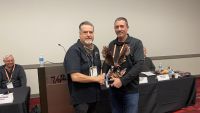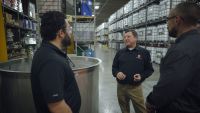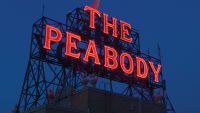Contractor to Contractor: Shook Construction
By Masonry

Since 1926, Shook Construction has had a reputation for quality work and customer satisfaction in the construction industry. In the past 30 years, the company has acquired six Build Ohio awards, two Build Indiana awards and three Build America awards, along with a host of other prestigious honors. Shook Construction offers services within a seven-state region and boasts world-renowned clients such as General Motors. Highly regarded for its design-build approach and commitment to conservative management and safety regulations, Shook Construction has become a nationwide industry leader. Vice President Bill Whistler spoke with Masonry regarding the company's management strategy, business approach and keys to success.
Masonry: Shook Construction was founded 80 years ago. What assets do you attribute to the company's longevity and success?
Whistler: Continued recruitment and development of good people who share our core values. The core values are integrity, strong work ethic and collaborative spirit to build our projects. We spend a lot of time recruiting and picking people. We're very choosy when it comes down to adding somebody into our Shook family. Part of that is making sure that we have a culture fit, and I think that's the foundation that's been keeping us going for 80 years.
Masonry: Your website mentions that "conservative management" is a main strategy that has helped keep the company strong. Please explain a little more about this concept.
Whistler: Part of our whole strategic plan is for conservative, steady growth. It's important for us to grow our company and to continue to provide opportunities for our key people. That said, we only select new projects that match up with our strengths. We don't bite off more than we can chew. We never accept an invitation to bid, or answer a request for a proposal, if we aren't 100 percent sure that we have a team to go build that job — and not only a team, but that team's commitment to go build that job. That's really where the conservatism comes into play.
Masonry: Shook has completed projects in 11 states, from Illinois to Pennsylvania, down to Florida. What are some of the biggest obstacles in overcoming these distances while still maintaining quality work?
Whistler: When we do that, we're moving into a different labor market. We're moving into a different specialty contractor market, a different materials supplier market. Before we ever move into a different geographic market, we spend a lot of time gathering intelligence to understand those variables.
Likewise, we interview and pre-qualify materials suppliers and specialty contractors. In doing so, we try to alleviate some of the risk that's involved when moving into a new marketplace. We do our homework.
Masonry: Throughout the years, your company has won numerous awards for projects. How has this affected the company and its growth?
Whistler: It sends a great message to our associates, the people that help us do the work, and also to new potential clients. They're great pats on the back ... When you're recognized among all your peers, and a lot of other engineers and architects are there, the next time they have an influence on who's going to be able to bid on a particular project, they'll be there to validate our name when it's mentioned.
Masonry: Two years ago, Shook Construction received an "Outstanding General Contractor Award" from the regional American Subcontractors Association. What does it mean to you to receive this award?
Whistler: We operate our general contracting and masonry operations as two separate businesses. They have two separate business plans and two different strategies. The reason they do is because they don't necessarily coincide business cycle-wise. We may need all our masonry work to be done under general trade work, all at the same time, and we have a limited supply of skilled craftsmen and foremen. Likewise, it's important that we keep those masonry employees constantly busy over a year's time.
In our general contracting business, we subcontract 80 percent of our work. So, 80 percent of our effort and work is based on what is provided by specialty contractors. The extent to which we do a good job organizing a project and make those specialty contractors efficient in their operations and able to derive a profit, we receive very competitive proposals from them on the next job.
We live and breathe on the general contracting site by our specialty contractors. Every once in a while, they raise their hands and say we're the best general contractor in the area to work for, and it really means a lot to us.
Masonry: Shook Construction offers a design-build approach. Explain how adding this service has been beneficial.
Whistler: Owners, more and more, want to get their projects completed faster and faster so they can develop a revenue stream earlier. Whatever owners we're working for, we always find they have a completion date in sight. More times than not, it's a little over the top.
The design-build approach really enables us to meet their needs. It enables us to overlap design and construction activities so that we can get the project coming out of the ground while the owners are making final programming and design decisions relative to what the interiors of the building are going to look like. It's a faster delivery method.
We enjoy it because we have great relationships with specialty contractors and local designers, and we're a very collaborative company. We love sitting around the table with the owner, designer and key specialty contractors and figuring out how we can get that owner what he or she needs.

Masonry: You have a very strong policy concerning safety. Tell us a little more about what steps you take to keep safety at the forefront with such a large organization.
Whistler: Regardless of how large the company is, you either have a culture of maintaining a safe workplace or not, and that culture starts at the top. In every communication our CEO makes to our employees, he says that each and every one of them has the responsibility — before they assign one of their associates a work task — to ask themselves whether they would ask their husband, wife, grandchild or child to do that task. If it's well planned and safe enough that they would ask someone in their family to do it, then it's safe enough for our employees. We treat our employees like our family. If you do that, you're going to think ahead and you're going to figure out a safe way to do it to ensure that they go home that night.
If you do all of those things, safety becomes an easy thing to do, and that's really a departure from what we've seen a lot of other companies doing. We embrace all the training and state-of-the-art safety practices. We have a good relationship with the local OSHA office, and our corporate safety director is president of the local area safety council. We do all those normal, corporate, due-diligence items, but at the top of the company, we send a strong message to our people that it's just the way it is around here.
Masonry: Your company has been involved in an array of building projects — from educational and health care facilities, to religious buildings and parking structures. Looking back, what would you say was your most difficult project and how did you overcome the obstacles?
Whistler: For me personally, we did a $10 million industrial project in 23 calendar days. When we were asked to bid on the project, it was one of those things where we had to reach real deep and decide, first of all, can we really do this? We engaged our employees, sat down and put a plan together. We hand-picked specialty contractors. We didn't invite the world to bid on each component — we picked the best of the best. We said, together, this team is either going to win or lose this job, and if we can't win this job with this team, then we don't really need this job.
Well, we won it and had about six weeks to plan the work in a very detailed manner, on an hour-by-hour basis, to ensure we were successful. It was a 24/7 job, and we met formally as a group at least twice a day in progress and coordination meetings ... It was a job that just never slept.
We brought it in on time and satisfied a major industrial client that we've worked with for over 50 years.
Masonry: What is the best advice you would give a budding mason contractor?
Whistler: I'd say to pick good, key people and work together with those people to develop a sound business plan. Build your company like you build buildings — with a strong foundation and slowly and steadily.
I see so many new people coming into the business, and they want it all now. They're like teenagers — they've got to have it right now, and it just doesn't work like that. You have to start slow, be successful and build on that success. It takes patience and the ability to surround yourself with good, key people.
Masonry: What do you feel is the biggest misconception about the masonry industry?
Whistler: That it is not very technologically advanced. That's a misconception of many laypeople about construction in general. If you ask a layperson to describe a construction worker, they're going to draw you this picture of a less-than-sophisticated brute of a man, and our industry is anything but that.
We know that masonry, in particular, is very labor intensive, so as businesspeople, we try to make that labor as efficient as possible. All the innovations in scaffolding, if nothing else, in the last five to ten years really show you the type of creativity that all of us in our businesses have. We are always trying to figure out a better way to do something, and a lot of times it involves technology. This is just starting. There will be more and more technology influence in how we do our work.
Masonry: What would you do to change that misconception?
Whistler: An association like MCAA is probably the right entity to do regular press releases for mainstream publications that provide examples of innovative solutions to unique challenges. That's a way to change the perception over the long term.
The people in our industry — architects, engineers, specialty contractors — we get it. We understand. To us, there is no misconception. It's mainstream America that owns companies, which decide whether masonry is going to be a component of their new facility. Those are the people it would help to influence over time.
Likewise, and probably more importantly, we really need to change the misconception for the young men and women who are getting ready to enter the workplace and trying to make some career decisions. They can have this perception that they either fit or don't fit into a construction person's mold, or they think it's an unsophisticated industry; we've got to change that. The MCAA should target that demographic and we'll all benefit from it.

Masonry: What are your three biggest concerns in keeping your company successful?
Whistler: We're a union contractor. We've made a choice to complete our masonry work using the union workforce, so with that in mind, I would say remaining competitive as a union masonry contractor in a blended marketplace.
The second thing is the ability to continue to recruit young, skilled craftsmen in the industry in order to replace an aging workforce ... Also, the ability to recruit competent, well qualified and legal Hispanics in our workforce. We are all about finding that legal immigrant who has come to this country trying to do better for himself or herself and their families, and who are out in the marketplace working for less than a living wage. We are all about finding those people and getting them paid the wages and benefit packages that they have the potential to earn. And also to be able to integrate them into a mostly non-Hispanic workforce and do that seamlessly; there are a lot of challenges to that. ... We are actively working on it everyday. We know in our hearts that there are a lot of people working in this country who are legal, well skilled and can do the work to help us on a daily basis.
Masonry: What do you feel is the industry's biggest challenge in the near future?
Whistler: I touched a little bit on the integration of Hispanics in the workforce, but another concern is the protection that brick manufacturers provide to their local or area dealer reps. We work in a free market society, but what we find is that there is one company, and one company only, who can sell us the brick on one particular job.
When people know they don't have any competition, price, service and the ability to agree to what we feel are reasonable terms and conditions for delivery and payment can be negatively influenced. You can lose any negotiating power that you have on behalf of your company and your client if there's not a good market competition in each component of the project. ... If we can change that, we can do our project and our client a service.
Masonry: Where do you think the masonry industry is going to be 10 years from now?
Whistler: I think we'll continue to see more and more technical innovation to offset the labor demands. We're going to continue to struggle to get good, qualified craftspeople in our industry. We'll also see more and more companies working to reduce that pressure through technical innovation, so we're going to see a lot of changes in the tools and equipment we use to do our work.
Masonry: What do you think will be the masonry industry's biggest competitor in 10 years?
Whistler: I'd say, without a doubt, it's precast wall construction. The precast industry has become very innovative and has done a much better job with their product in terms of offering varied looks and textures and materials they incorporate into their wall panels. I truly think that the best way to compete is to continue to offer the flexibility that our product offers.
Many times, you'll talk to clients about their decisions to go with a precast or composite construction. When it gets down to it, if it's a cookie-cutter design, the precast wall panel is probably going to win. If it's something that has a lot of variation to it — a lot of ins and outs and not a lot of repetition — I believe masonry is always going to win, not only on a first-cost basis, but also on an overall cost basis.
Masonry: What do you feel are the most critical issues you'll face with future government regulations?
Whistler: One that we see in our local market is removal of prevailing wage requirements on state work. Federal work here continues to have a prevailing wage; state work does not.
What does that mean? What we see is that on non-prevailing wage work, oftentimes there are new players in the market who are paying less than living wages to their employees, which brings the price point down and ruins the rest of the market. It's not so much of a governmental issue as that we need to pay the people who help us build our projects a wage that enables them to have a good standard of living and put their kids through college if they want to.
All I can say is I think a prevailing wage requirement on governmental work — be it state or federal — helps create a better quality of life for the people constructing the work.
Masonry: Which group do you feel has a bigger impact on masonry's future: architects, engineers or general contractors?
Whistler: I would say architects and engineers, for the most part. They're the ones that typically decide whether masonry is going to be used on projects. Let's say 80 percent of the work is non-design-build. Then 80 percent of our future is going to be impacted by the architects and engineers. If it's 20 percent design-build in our marketplace right now, it will be a split 50-50 between architects and general contractors on the design-build portion of the market.
Masonry: What do you like most about being a member of MCAA?
Whistler: It's the collaborative spirit and sharing of ideas. We have been active supporters of a variety of contractor associations, the MCAA being just one of those. It's an age-old deal: you're writing out the check at the end of the year for your dues and asking yourself about the return on the investment and whether you should do it next year.
Our experience as a company is that we have overwhelmingly been blessed with great rewards out of all of our association work. It's very much been an intangible benefit in that ability to call up a peer in a different market who is not your direct competition and ask them a question about your strategy or business plan. Maybe you met that person because you were at an MCAA conference a couple years ago, had a cup of coffee with them, and developed a relationship. It's those relationships that we get out of our association work that oftentimes help us when we're trying to work through issues in our business.
The other thing we have benefited from are joint-venture relationships. So many of our peers are interested in expanding their business in similar fashions that we are. Sometimes when we desire to go after a project that is bigger than something we would normally go into ourselves, we form a joint venture and those projects have been very successful.
About the Author
Masonry, the official publication of the Mason Contractors Association of America, covers every aspect of the mason contractor profession - equipment and techniques, building codes and standards, business planning, promoting your business, legal issues and more. Read or subscribe to Masonry magazine at www.masonrymagazine.com.















